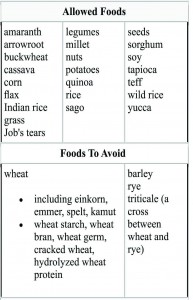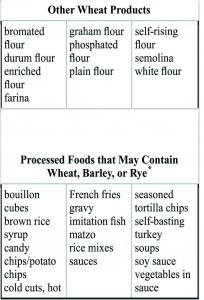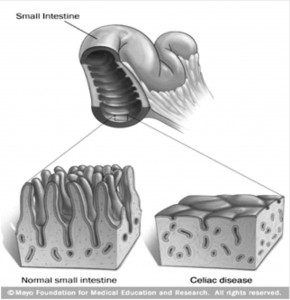By Tisha Boston
Today, Friday, September 13th is generally conceived as an unlucky day in Western superstition. However, what most of you may not know is that today also happens to be National Celiac Disease Awareness Day. Celiac disease, also known as celiac sprue or gluten-sensitve enteropathy, is a digestive and autoimmune disorder that damages the small intestine and interferes with the absorption of nutrients. Autoimmunity is an immune response against the body’s own cells, tissues, and organs. This reaction is due to gluten, a protein mainly found in wheat, rye, and barley.
When people with celiac disease eat foods containing gluten, the immune system responds by damaging the villi, which are tiny, finger-like projections that line the small intestine. Villi provide increased surface area to absorb nutrients from food through the walls of the small intestine into the bloodstream. In celiac-diseased individuals, when the villi become shortened and gradually flattened out, no matter how much food these persons eat, they will be malnourished. Such intestinal damage results in digestive problems such as abdominal bloating, pain, gas, diarrhea, pale stools, and weight loss.
Poor nutrient absorption as well as inflammation of the gastrointestinal tract brought on by celiac disease can also lead to other health problems; this is referred to as non classic celiac disease. These health problems include low blood count (anemia), low bone mineral density (osteoporosis), itchy skin rashes (dermatitis herpetiformisis), chronic fatigue, joint pain, poor growth, delayed puberty, infertility or recurrent miscarriages, and defects in the enamel of the teeth. Neurological problems also associated with the disease include migraines, attention deficit hyperactivity disorder (ADHD), and recurrent seizures (epilepsy).
Diagnosis of celiac disease involves blood tests, and in most cases a biopsy of the small intestine. Celiac disease often goes undiagnosed because the symptoms are nonspecific, meaning that they are common to other disorders as well. Also, some people with celiac disease may show no symptoms at all; these are said to have silent celiac disease.
A gluten-free diet is a lifetime requirement for people with celiac disease so it is important for such persons to speak to a dietician or a physician who specializes in celiac disease to learn about food selection, label reading, and other strategies to help manage the disease.
Here are some dietary recommendations 





